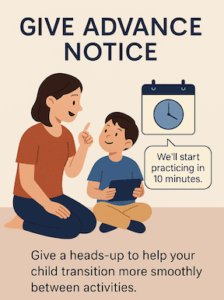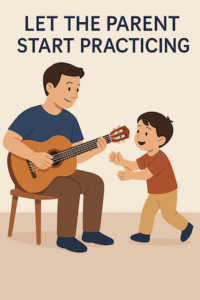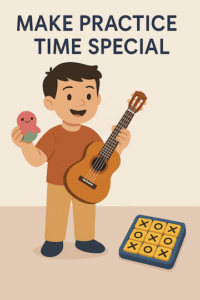Even in the most musical households, there are days when practice feels like a struggle. Rest assured—this is completely normal! In this post, I’ll share a few go-to strategies to help your child transition more smoothly into practice time and make it a more positive experience for everyone.
Most of the time, a supportive environment and a consistent listening routine are all you need to keep things running smoothly. But when motivation dips (as it inevitably does), these tips can help you get back on track:
🔔 Give Advance Notice
Children often need time to mentally prepare before switching tasks. Instead of saying “Let’s go practice now,” try giving a heads-up:
“We’re going to start practicing in 10 minutes.”
Adjust the timing based on what works for your child—some may need a countdown at 15, 10, 5, and 1 minute. These gentle reminders give kids space to finish what they’re doing and shift their focus more willingly.

⏱ Set a Practice Time Limit
Some children feel more comfortable when they know how long an activity will last—especially if they’re not excited about it. Setting a small, consistent goal can help reduce resistance.
Start with just one minute a day if you need to!
The key is consistency. As Dr. Suzuki famously said, “Practice on the days that you eat.”
🎸 Start With the Parent Practicing
If your child is resisting practice, try picking up the guitar yourself. Play a few notes, or start doing one of their review pieces.
Often, your child will become interested—or even a bit possessive—and will want to take the instrument back and play it themselves. This playful tactic can break through resistance without turning into a battle.

🎁 Use a Reward System
I use the 100-Day Practice Challenge with many of my students, and it has led to some incredible results. Over a dozen students have made it to one full year of daily practice, with one student hitting the three-year mark!
When your child knows that consistent effort leads to meaningful rewards, it can help build momentum. Over time, that external motivation transforms into internal pride and self-motivation.
One of the keys to any rewards system is to decrease the frequency of the rewards over time so the child gradually becomes more invested in the habit. For the 100-Day Challenge, I give prizes at 25 days, 50 days, 100 days, 200 days, 1 year, 2 years, etc.
This keeps the goal exciting while gradually shifting the focus from prizes to personal growth.

🎯 Create a Practice-Only Game
Practice time should feel special—not like a chore. One way to make it fun is by getting a special toy or game that your child can only use during practice sessions.
Take your child to pick out something small—like a squishy toy, animal figurine, or simple game—and explain that it’s just for music time. You can use it in repetition games or as a silly motivator when focus starts to wane. In my next post, I’ll share some of my favorite practice games that students love.

Final Thoughts
Above all, remember that every child is different—what works one day might need a small tweak the next. But with patience, creativity, and a few tried-and-true tools, home practice can become a moment of connection, growth, and joy.
Keep an eye out for the next post in this series, where I’ll show you how to use games to make repetition more fun and musical learning more engaging!